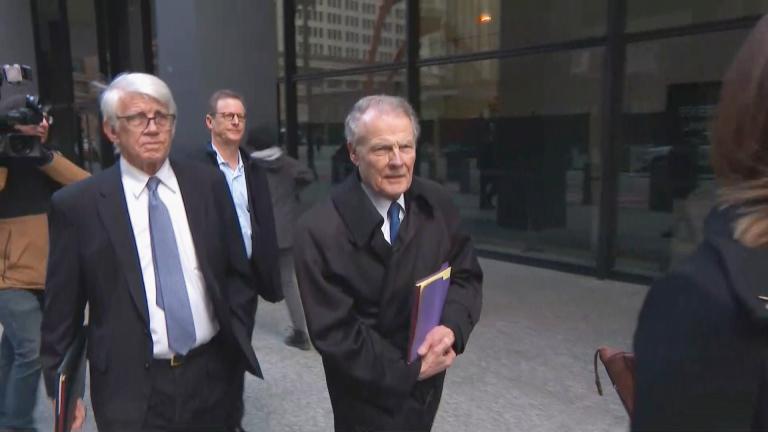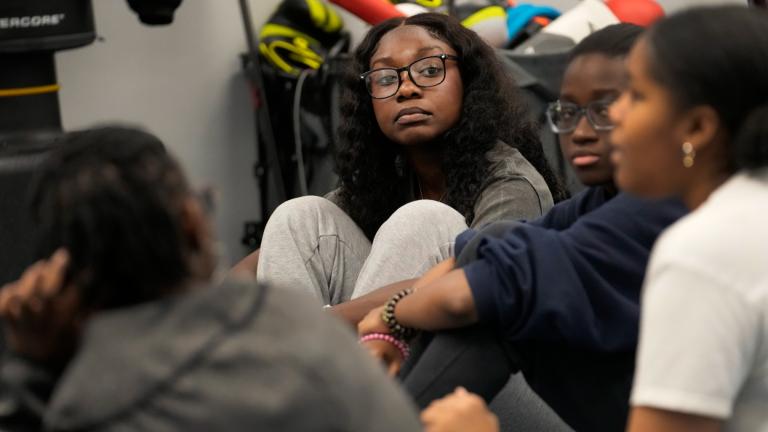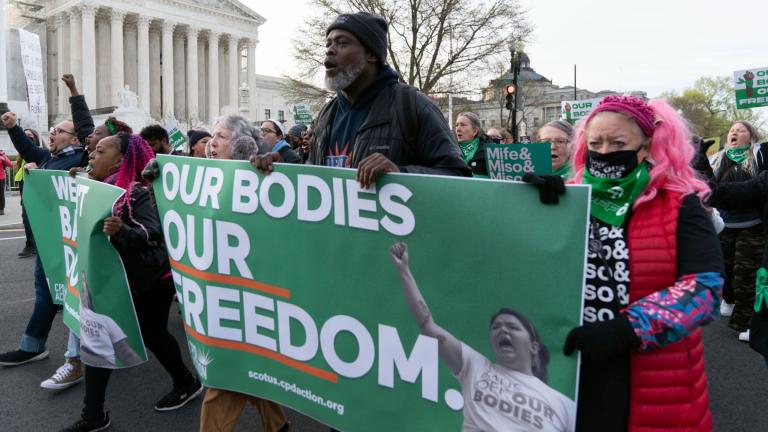They are some of the most divisive issues of our time: abortion, affirmative action, contraception, unions and immigration. And they are all issues that are under consideration by the U.S. Supreme Court this term.
Joining us to outline the cases are three former U.S. Supreme Court clerks: David Franklin, associate professor of law at DePaul University where he teaches Constitutional Process and who clerked for Justice Ruth Bader Ginsburg from 1999 to 2000; Illinois Solicitor General Carolyn Shapiro, who clerked for Justice Stephen Breyer from 1996 to 1997; and Adam Mortara, who works at the firm Bartlit Beck Herman Palenchar & Scott LLP and clerked for Justice Clarence Thomas from 2002 to 2003.
As to this year's seemingly loaded docket, Franklin says it's not so different from other years.
"The court is taking fewer cases, it seems, every year," he said. "But the density level is increasing because there are more hot-button issues in that smaller docket. So yeah, every year seems like a banner year."
More details about the cases, below.
Abortion Rights: Whole Women’s Health v. Cole
According to the New York Times, this case will be the first major abortion case heard by the Supreme Court since 2007 (Gonzales v. Carhart). In 1973, Roe v. Wade established the constitutional right to an abortion. In 1992, Planned Parenthood v. Casey decision stated states may not place undue burdens on the constitutional right to an abortion, including “unnecessary health regulations that have the purpose or effect of presenting a substantial obstacle to a woman seeking an abortion.”
In 2013, the Texas Legislature passed a bill that required any physician performing an abortion have admitting privileges at a hospital within 30 miles of where the abortion was performed and that abortion clinics meet standards for ambulatory surgical centers.
“Proponents of the bill say they were seeking to safeguard women’s health; abortion rights supporters say the regulations are medically unnecessary and present an ‘undue burden’ on women’s rights that they will challenge in court,” according to a New York Times article.
Before the Texas law was passed there were 41 abortion clinics in the state. Now there are 17 and if the law is upheld by the Supreme Court, that number could fall to 10. In June, the Supreme Court issued a stay of the United States Court of Appeals for the Fifth Circuit, which largely upheld the Texas law, until it issues its decision.
Justice Anthony Kennedy is seen as the deciding vote on this issue, according to the Washington Post, which reports that “Kennedy is the only justice remaining of the three who wrote the Casey standard in 1992 and will again be the pivotal justice in deciding whether state restrictions violate it.”
Contraception Coverage: Zubik v. Burwell
The Supreme Court will also decide whether the contraception mandate in the Affordable Care Act violates the religious freedom of religiously affiliated organizations like universities, hospitals and charities.
The Obama administration, according to the Washington Post, has given the organizations the option to opt out of providing contraception coverage.
“Employers who object must make clear their religious objections and let insurance companies and the government take over from there,” a Washington Post article states. “But [petitioners] say even that step would implicate them in what they believe to be a sin, adding that they face ruinous fines if they refuse to comply.”
The Zubik v. Burwell case is the consolidation of seven cases: Zubik v. Burwell; Priests for Life v. Department of HHS; Roman Catholic Archbiship v. Burwell; Texas Baptist University v. Burwell; Little Sisters of the Poor v. Burwell; Southern Nazarene University v. Burwell; and Geneva College v. Burwell.
Affirmative Action: Fisher v. University of Texas at Austin
Supreme Court justices will consider whether the equal protection clause of the 14th Amendment allows for the consideration of race in undergraduate admissions decisions.
The origins of the case date back to 2008 when Abigail Fisher, a white student, was denied admission to the University of Texas at Austin. She alleged that the university denied her admission because of her race. According to the New York Times, the University of Texas first admits the students who graduate in the top 10 percent of their Texas high school class.
“For the remaining students, the plan takes account of race as one factor among many, the approach used by many selective colleges and universities nationwide,” the Times article states. “Ms. Fisher sought admission under the second part of the plan.”
In 2013 the Supreme Court returned the case to an appeals court by a 7-1 vote (Justice Elena Kagan recused herself and Justice Ruth Bader Ginsburg dissented). The U.S. Court of Appeals for the Fifth Circuit upheld the University of Texas program in a 2-to-1 vote, according to the Washington Post.
In December 2015, the Supreme Court heard oral arguments for the Fisher v. University of Texas at Austin case. During the hearing, Justice Antonin Scalia caused an uproar when he said:
“There are – there are – those who contend that it does not benefit African-Americans to – to get them into the University of Texas where they do not do well, as opposed to having them go to a less-advanced school, a less – a slower-track school where they do well. One of – one of the briefs pointed out that – that most of the – most of the black scientists in this country don't come from schools like the University of Texas ...
"They come from lesser schools where they do not feel that they're – that they're being pushed ahead in – in classes that are too – too fast for them.”
Listen to Scalia’s comments in the video below.
Unions: Friedrichs v. California Teachers Association
Last week, the Supreme Court heard oral arguments for a case concerning 10 California teachers who have opted out of the public union but must pay “fair share” fees, which are union dues that even non-union members are forced to pay.
While government workers who have opted out of a union have been able to receive refunds for political activities funded by unions, the Friedrichs’ case questions whether workers must pay any dues for union activities, including negotiating for better wages and benefits.
The plaintiffs argue that these “fair share” fees are inherently political:
“They claim that any money—even representation fees—given to public sector unions is political (and therefore protected) ‘speech’ under the First Amendment,” a Washington Post article states. “In other words, union representation fees are equivalent to forcing someone to ‘say’ something particular to the government and this is unconstitutional.”
Unions and their supporters say “that a decision in the plaintiffs’ favor would encourage many workers who are perfectly happy with the work of their unions to make the economically rational decision to opt out of paying for it,” according to a New York Times article.
Immigration
Although it’s not currently on the list of cases the Supreme Court has agreed to take up, it could decide to take action on President Barack Obama’s 2014 executive action on immigration. The action could give as many as 5 million undocumented immigrants permission to work and a three-year reprieve from being deported.
The president’s action has been blocked by lower courts after Texas and 25 other Republican governed states sued to stop it, according to Reuters. A February 2015 decision by the U.S. Circuit Court of Appeals upheld the decision to block Obama’s action.
If the Supreme Court does not hear the case, Obama’s executive action “would be effectively dead, with Obama’s term in office ending January 2017.”







